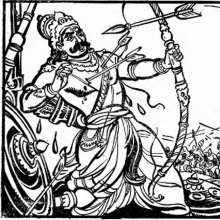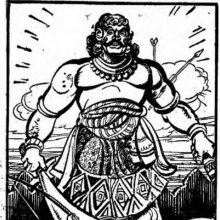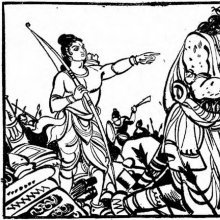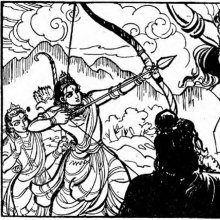Astra, Ashtra, Aṣṭrā, Āṣṭra, Āstra: 21 definitions
Introduction:
Astra means something in Hinduism, Sanskrit, Marathi, Hindi. If you want to know the exact meaning, history, etymology or English translation of this term then check out the descriptions on this page. Add your comment or reference to a book if you want to contribute to this summary article.
The Sanskrit terms Aṣṭrā and Āṣṭra can be transliterated into English as Astra or Ashtra, using the IAST transliteration scheme (?).
Images (photo gallery)
In Hinduism
Purana and Itihasa (epic history)
Source: Google Books: Cultural History from the Vāyu PurānaAstra (अस्त्र):—They are mostly magical weapons supposed to have been used.
Source: archive.org: Puranic EncyclopediaAstra (अस्त्र).—After killing the demoness, Tāṭakā, Viśvāmitra reveals to Rāma and Lakṣmaṇa the secret of using a great many varieties of Divyāstras (divyāstra is missile charged with power by holy incantation).
Some of those astras are named below:
- daṇḍacakra,
- dharmacakra,
- kālacakra,
- viṣṇucakra,
- indracakra,
- vajrāstra,
- śaivaśūla,
- aiṣīka,
- brahmaśirāstra,
- brahmāstra,
- modakīśikharī,
- dharmapāśa,
- kālapāśa,
- vāruṇāstra,
- vāruṇapāśa,
- paramāstra,
- pinākāstra,
- nārāyaṇāstra,
- āgneyāstra,
- śikharāstra,
- vāyavyāstra,
- prathanāstra,
- krauñcāstra,
- hayaśśirāstra,
- kaṅkālāstra,
- musalāstra,
- kapālāstra,
- kaṅkaṇāstra,
- mānavāstra,
- prasthāpanāstra,
- praśamanāstra,
- saurāstra,
- varṣaṇāstra,
- śoṣaṇāstra,
- santāpanāstra,
- vilāpanāstra,
- madanāstra,
- mohāstra,
- saumanāstra,
- saṃvartāstra,
- satyāstra,
- māyādharāstra,
- tejaprabhāstra,
- saumyāstra,
- śiśirāstra,
- tvāṣṭāstra,
- sudāmanāstra.
Śrī Rāma received all these astras standing facing east.—(Cf. Sarga 27, Bālakāṇḍa, Vālmīki Rāmāyaṇa)
Source: Cologne Digital Sanskrit Dictionaries: The Purana IndexAstra (अस्त्र).—Arranged alphabetically: Asiratnam, Āgneyam, Aindram, Aiṣīkāmam, Kampanam, Kāpalam, Kālamudgaram, Kainkaram, Krauñcam, Gāndharvam, Tāpanam, Tvāṣtram, Nandakam, Nārasimham, Nārāyaṇāstram, Pāśupatam, Paiśācam, Pramathanam, Prasthāpanam, Prasvāpanam, Brahmaśiras, Brāhmam, Bhāvanam, Bhairavam, Mathanam, Mahābalam, Māyādharam, Mohanam, Mausalam, Raudram, Vāruṇam, Vikampanam, Vāyavyam, Śātanam, Śāmanam, Śailam, Ṣośadam, Samvartanam, Sārpam, Sāvitram, Somāstram, Hayaśiras;1 used by Hiraṇyakaśipu against Narasimha; arms used in Bhaṇḍāsura war.2
- 1) Matsya-purāṇa 150. 113, 164, 205; 151. 24, 31; 153. 83, 87, 90, 97; 162. 22-7; 179. 6.
- 2) Brahmāṇḍa-purāṇa IV. 29. 62-74.

The Purana (पुराण, purāṇas) refers to Sanskrit literature preserving ancient India’s vast cultural history, including historical legends, religious ceremonies, various arts and sciences. The eighteen mahapuranas total over 400,000 shlokas (metrical couplets) and date to at least several centuries BCE.
Shaktism (Shakta philosophy)
Source: Google Books: ManthanabhairavatantramAstra (अस्त्र) refers to the weapons (attributes) of Goddess Kubjikā, according to the Manthānabhairavatantra, a vast sprawling work that belongs to a corpus of Tantric texts concerned with the worship of the goddess Kubjikā.—Accordingly, “(Now) I will tell (you about) the great weapons [i.e., astra] of that (goddess) Kubjikā. Know (the ones that are in) the right (hands) and (the ones) in the left, along with (their) application. In the right (hands she holds) a trident, wheel, thunderbolt, goad, arrow and dagger. One should place (her on) a blue lotus with a star. Then on the left (side her hands hold) a severed head, an ascetic’s staff, bell, book and bow. It is said that (she holds) a skull in (the lower) left (hand) and sits on a ghost as her throne. [...] The great accomplishment of (all) the weapons [i.e., astra] in the Mahāmata by means of the skull”.

Shakta (शाक्त, śākta) or Shaktism (śāktism) represents a tradition of Hinduism where the Goddess (Devi) is revered and worshipped. Shakta literature includes a range of scriptures, including various Agamas and Tantras, although its roots may be traced back to the Vedas.
Kavya (poetry)
Source: Brill: Śaivism and the Tantric Traditions (kavya)Astra (अस्त्र) refers to “weapons”, according to Kālidāsa’s Raghuvaṃśa verse 8.3-4.—Accordingly: “Having experienced his great consecration with water gathered by Vasiṣṭha, the earth seemed to express her contentment with clear sighs. When the ritual had been performed for him by the guru who knew the Atharvaveda, he became unassailable by his enemies, for when Brahman is united with the power of weapons (astra-tejas) it is a union of wind and fire”.

Kavya (काव्य, kavya) refers to Sanskrit poetry, a popular ancient Indian tradition of literature. There have been many Sanskrit poets over the ages, hailing from ancient India and beyond. This topic includes mahakavya, or ‘epic poetry’ and natya, or ‘dramatic poetry’.
Shaivism (Shaiva philosophy)
Source: SOAS University of London: Protective Rites in the Netra TantraAstra (अस्त्र) or Astramantra is the name of a Mantra, according to the Netratantra of Kṣemarāja: a Śaiva text from the 9th century in which Śiva (Bhairava) teaches Pārvatī topics such as metaphysics, cosmology, and soteriology.—Accordingly, [verse 2.28cd-33]—“Now, I shall explain the limbs of the mantra, with which, tied together, he achieves perfection. [...] The netra [aṅgamantra], [which is] most powerful and destroys all faults, begins with Bhairava [j], and an oṃ [and] situated with a head always in motion [y]. That astramantra is proclaimed ajīvaka [pha] [e.g., ajīvakaṭasaṃyuktam astram] joined with ṭa. The six aṅgas of the mantrarāṭ [i.e., the mṛtyuñjayamantra], which confers siddhis, is declared”.

Shaiva (शैव, śaiva) or Shaivism (śaivism) represents a tradition of Hinduism worshiping Shiva as the supreme being. Closely related to Shaktism, Shaiva literature includes a range of scriptures, including Tantras, while the root of this tradition may be traced back to the ancient Vedas.
Yoga (school of philosophy)
Source: ORA: Amanaska (king of all yogas): A Critical Edition and Annotated Translation by Jason BirchAstra (अस्त्र) refers to the “weapon mantra”, according to the Brahmayāmala-tantra (or Picumata), an early 7th century Śaiva text consisting of twelve-thousand verses.—Accordingly, [while describing a haṭha-sādhana (foreceful practice)]: “[...] O goddess, he could slay everyone [through] the weapon Mantra (astra) taught earlier [and] with the Vidyā mantra. Having become fearless and situated in the state of [liberation from which there is] no return, the [Sādhaka] could subdue me along with you. What [to speak of] other leaders of the spirits? [...]”

Yoga is originally considered a branch of Hindu philosophy (astika), but both ancient and modern Yoga combine the physical, mental and spiritual. Yoga teaches various physical techniques also known as āsanas (postures), used for various purposes (eg., meditation, contemplation, relaxation).
General definition (in Hinduism)
Source: WikiPedia: HinduismAstra (अस्त्र): A missile charged with power by a holy incantation.
Languages of India and abroad
Marathi-English dictionary
Source: DDSA: The Molesworth Marathi and English Dictionaryastra (अस्त्र).—n (S) A weapon charmed by the recitation over it of some mystic formula: also the formula or mantra. Ex. of comp. agnyastra, vārūṇāstra, mēghāstra, sarpāstra, astravidyā, astraprayōga. 2 S A Weapon gen.
Source: DDSA: The Aryabhusan school dictionary, Marathi-Englishastra (अस्त्र).—n A charmed weapon; a weapon generally. अ. yuddha n Fighting with weapons.
Marathi is an Indo-European language having over 70 million native speakers people in (predominantly) Maharashtra India. Marathi, like many other Indo-Aryan languages, evolved from early forms of Prakrit, which itself is a subset of Sanskrit, one of the most ancient languages of the world.
Sanskrit dictionary
Source: DDSA: The practical Sanskrit-English dictionaryAṣṭrā (अष्ट्रा).—[akṣyate cālyate'nayā akṣ-karaṇe ṣṭran]
1) A prick or goad for driving cattle, whip; Ṛgveda 4.57.4,6.53.9.
2) A part of the wheel of a chariot.
-vin a. obeying the goad (as a bull); शुनमष्ट्राव्यचरत् कपर्दी (śunamaṣṭrāvyacarat kapardī) Ṛgveda 1.12.8.
--- OR ---
Astra (अस्त्र).—[asyate kṣipyate as ṣṭran Uṇādi-sūtra 4.158.]
1) A missile; a weapon in general; प्रयुक्तमप्यस्त्रमितो वृथा स्यात् (prayuktamapyastramito vṛthā syāt) R.2.34; प्रत्याहतास्त्रो गिरिशप्रभावात् (pratyāhatāstro giriśaprabhāvāt) 2.41;3.58; अशिक्षतास्त्रं पितुरेव (aśikṣatāstraṃ pitureva) R.3.31 the science of missiles. महर्षेरग्निवेशस्य सकाशमह- मच्युत । अस्त्रार्थमगमं पूर्वं धनुर्वेदचिकीर्षया (maharṣeragniveśasya sakāśamaha- macyuta | astrārthamagamaṃ pūrvaṃ dhanurvedacikīrṣayā) || Mahābhārata (Bombay) 1.131.4. धनुर्वेद- संहिता (dhanurveda- saṃhitā) mentions various kinds of missiles (179-82) as ब्रह्मास्त्र, ब्रह्मदण्डक, ब्रह्मशिरस, पाशुपत, वायव्य, आग्नेय, नारसिंह (brahmāstra, brahmadaṇḍaka, brahmaśirasa, pāśupata, vāyavya, āgneya, nārasiṃha) &c.
2) An arrow; sword.
3) A bow.
Derivable forms: astram (अस्त्रम्).
--- OR ---
Āṣṭra (आष्ट्र).—[aś-vyāptā ṣṭran Uṇādi-sūtra 4.159] Sky, ether, atmosphere.
-ṣṭrā A prick or goad for driving cattle.
Derivable forms: āṣṭram (आष्ट्रम्).
--- OR ---
Āstra (आस्त्र).—a. [astrasyedaṃ aṇ] Belonging to a missile; चतुर्थमास्त्रिकवलम् (caturthamāstrikavalam) Śukra.4.866.
See also (synonyms): āstrika.
Source: Cologne Digital Sanskrit Dictionaries: Shabda-Sagara Sanskrit-English DictionaryAstra (अस्त्र).—n.
(-straṃ) 1. A weapon in general. 2. A sword. 3. A bow. 4. A missile weapon. E. asa to throw, ṣṭran Unadi aff.
--- OR ---
Āṣṭra (आष्ट्र).—n.
(-ṣṭraṃ) Æther, the sky or atmosphere. E. as to throw, to send, ṣṭran Unadi aff.
Source: Cologne Digital Sanskrit Dictionaries: Benfey Sanskrit-English DictionaryAṣṭrā (अष्ट्रा).—i. e. aś + tra (vb. śo, cf. [Latin] incitare), f. A goad.
--- OR ---
Astra (अस्त्र).—[as + tra] 2., n. 1. A missile weapon, [Śākuntala, (ed. Böhtlingk.)] 94, 10; an arrow, [Vikramorvaśī, (ed. Bollensen.)] [distich] 18. 2. A bow, [Arjunasamāgama] 8, 2.
Source: Cologne Digital Sanskrit Dictionaries: Cappeller Sanskrit-English DictionaryAṣṭrā (अष्ट्रा).—[feminine] goad.
--- OR ---
Astra (अस्त्र).—[neuter] ([masculine]) dart; bow, arrow.
Source: Cologne Digital Sanskrit Dictionaries: Monier-Williams Sanskrit-English Dictionary1) Aṣṭrā (अष्ट्रा):—f. a prick or goad for driving cattle (regarded as the badge of the agriculturist, [Kauśika-sūtra]), [Ṛg-veda;]
2) [Zend] astrā; [Lithuanian] akstinas.
3) Astra (अस्त्र):—n. (exceptionally m., [Harivaṃśa 10703, etc.]), (√2. as), a missile weapon, bolt, arrow, [Atharva-veda xi, 10, 16; Muṇḍaka-upaniṣad] etc.
4) a weapon in general, [cf. Lexicographers, esp. such as amarasiṃha, halāyudha, hemacandra, etc.]
5) a sword, [cf. Lexicographers, esp. such as amarasiṃha, halāyudha, hemacandra, etc.]
6) a bow, [cf. Lexicographers, esp. such as amarasiṃha, halāyudha, hemacandra, etc.]
7) the art of throwing missiles, [Mahābhārata]
8) Name of a Mantra (pronounced, for instance, before reading a book or while kindling a fire etc.), [Bhaviṣya-purāṇa, khaṇḍa 1 & 2: bhaviṣya-purāṇa & bhaviṣyottara-purāṇa] etc.
9) Name of the mystical syllable phat, [Rāmatāpanīya-upaniṣad] (cf. [Greek] ἄστρον and ἀστήρ) ‘that which throws out or emits rays of light’ (?)
10) Āṣṭra (आष्ट्र):—n. ([from] √1. aś, [Uṇādi-sūtra iv, 159]), ether, sky, atmosphere
11) Āṣṭrā (आष्ट्रा):—[from āṣṭra] f. a prick or goad for driving cattle (= aṣṭrā q.v.), [Kāṭhaka]
Source: Cologne Digital Sanskrit Dictionaries: Yates Sanskrit-English Dictionary1) Astra (अस्त्र):—(stra) 1. n. A weapon, sword.
2) Āṣṭra (आष्ट्र):—(ṣṭraṃ) 1. n. Æther, sky.
Source: DDSA: Paia-sadda-mahannavo; a comprehensive Prakrit Hindi dictionary (S)Astra (अस्त्र) in the Sanskrit language is related to the Prakrit word: Attha.
[Sanskrit to German]
Sanskrit, also spelled संस्कृतम् (saṃskṛtam), is an ancient language of India commonly seen as the grandmother of the Indo-European language family (even English!). Closely allied with Prakrit and Pali, Sanskrit is more exhaustive in both grammar and terms and has the most extensive collection of literature in the world, greatly surpassing its sister-languages Greek and Latin.
Hindi dictionary
Source: DDSA: A practical Hindi-English dictionaryAstra (अस्त्र):—(nm) a weapon (esp. a missile); ~[kāra] an armourer; ~[jīvī] a professional soldier; ~[vidyā] the military science; the art of using weapons; ~[śālā] an arsenal, armoury.
...
Kannada-English dictionary
Source: Alar: Kannada-English corpusAstra (ಅಸ್ತ್ರ):—
1) [noun] a slender, pointed at one end and feathered at the other, for shooting from a bow; a mystical arrow.
2) [noun] (in gen.) a weapon; a missile.
Kannada is a Dravidian language (as opposed to the Indo-European language family) mainly spoken in the southwestern region of India.
See also (Relevant definitions)
Starts with (+112): Ashtradamshtra, Ashtravin, Astrabandha, Astrabhrit, Astrabudhna, Astracantha strobilifera, Astracarya, Astracharya, Astrachikitsa, Astrachikitsaka, Astracikitsa, Astracikitsaka, Astracuncu, Astradeva, Astradevate, Astradhara, Astradharaka, Astradharana, Astradharin, Astraea lobata.
Ends with (+814): Abdhivastra, Abhacchastra, Abhastra, Abhinayashastra, Abhinnarashtra, Abhirashtra, Abhivardhanashastra, Acara-shastra, Acarashastra, Acchadanavastra, Acchavakashastra, Achavakashastra, Achchhadanavastra, Adhikaranashastra, Adhirashtra, Adhivastra, Adhyatmashastra, Adirashtra, Adishastra, Agamashastra.
Full-text (+243): Astranivarana, Astrahina, Astracikitsa, Astracikitsaka, Astravidya, Astrajiva, Nirastra, Astragara, Astraghata, Astrayuddha, Ashtradamshtra, Astrika, Ashtravin, Narayanastra, Astrakaraka, Astragrama, Astrakashtaka, Astradharin, Astrakantaka, Astravid.
Relevant text
Search found 52 books and stories containing Astra, Ashtra, Aṣṭrā, Āṣṭra, Āstra, Āṣṭrā; (plurals include: Astras, Ashtras, Aṣṭrās, Āṣṭras, Āstras, Āṣṭrās). You can also click to the full overview containing English textual excerpts. Below are direct links for the most relevant articles:
Nitiprakasika (Critical Analysis) (by S. Anusha)
Mantramukta-astras < [Chapter 3]
Sarga II: Dhanurveda-viveka-kathana (64 Verses) < [Chapter 2]
War Weapons (2): Astras (Introduction) < [Chapter 3]
Lalitopakhyana (Lalita Mahatmya) (by G.V. Tagare)
Astras used by Bhaṇḍa and Lalitā
Chapter 28 - Viśukra and Viṣaṅga slain
Mareecha in Valmiki and Adhyatma Ramayana < [October – December, 2003]
The Freedom Concert Discordant Notes < [April – June, 1997]
Queen Sumithra - The Enlightened < [April – June, 1997]
Vastu-shastra (4): Palace Architecture (by D. N. Shukla)
Rig Veda (translation and commentary) (by H. H. Wilson)
Chaitanya Bhagavata (by Bhumipati Dāsa)
Verse 1.2.25 < [Chapter 2 - The Lord’s Appearance]
Verse 3.2.347-348 < [Chapter 2 - Description of the Lord’s Travel Through Bhuvaneśvara and Other Placesto Jagannātha Purī]
Verse 2.13.269 < [Chapter 13 - The Deliverance of Jagāi and Mādhāi]




